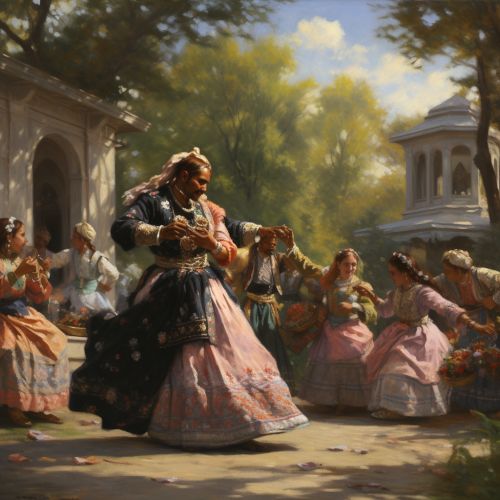Folkloristics
Overview
Folkloristics is the formal academic study of folklore, its traditions, and its culture. It is a discipline that encompasses various forms of expressive culture, including myths, legends, folktales, jokes, proverbs, customs, and various forms of folk art. Folkloristics is distinct from, yet closely related to, other disciplines such as anthropology, ethnology, and sociology. It is a field that has evolved significantly over time, with its roots tracing back to the 19th century.
History
The study of folklore emerged in Europe during the 19th century, primarily as a result of the romantic and nationalist movements. The term "folkloristics" was first used in the 1950s to distinguish the academic study of folklore from the folklore itself. Early folklorists were primarily interested in the preservation of folk traditions, often viewing them as remnants of ancient customs and beliefs. However, over time, the focus of folkloristics has shifted to understanding the role of folklore in contemporary societies and its relevance to identity and community.
Theoretical Approaches
There are several theoretical approaches within folkloristics, each with its own focus and methodology. These include the historical-geographical method, the psychoanalytic approach, the structuralist approach, and the contextual or performance approach.
Historical-Geographical Method
The historical-geographical method, also known as the Finnish method, seeks to trace the origins and diffusion of folk tales and myths. This approach assumes that a single original tale diffused over time and space, with variations arising due to local cultural and historical factors.
Psychoanalytic Approach
The psychoanalytic approach, influenced by the work of Sigmund Freud, interprets folklore in terms of unconscious desires and conflicts. This approach views folk tales and myths as symbolic expressions of psychological realities.
Structuralist Approach
The structuralist approach, influenced by the work of Claude Lévi-Strauss, analyzes the underlying structures of folk tales and myths. This approach assumes that these structures reflect universal patterns of human thought.
Contextual or Performance Approach
The contextual or performance approach focuses on the social context and performance aspects of folklore. This approach views folklore as a dynamic process, emphasizing the ways in which it is used and interpreted within specific social contexts.
Folklore Genres
Folkloristics encompasses the study of various genres of folklore, including oral traditions, material culture, and customary lore.
Oral Traditions
Oral traditions include folk tales, myths, legends, proverbs, riddles, and jokes. These forms of folklore are transmitted orally from generation to generation, and they often serve to convey moral lessons, cultural values, or historical memories.
Material Culture
Material culture refers to the physical objects and spaces that are associated with folk traditions. This includes folk art, architecture, crafts, and costumes, as well as landscapes and buildings that hold cultural significance.
Customary Lore
Customary lore includes rituals, ceremonies, games, dances, and other practices that are part of a community's cultural traditions. These customs are often tied to the life cycle, the agricultural cycle, or other significant events or times of the year.
Folk Groups
A folk group is any group of people who share a common cultural identity and express this identity through folklore. This can include ethnic groups, regional communities, occupational groups, and social groups. Folklorists study these groups to understand how folklore functions within them and how it contributes to their sense of identity and community.
Folklore and Identity
Folklore plays a crucial role in shaping and expressing cultural identity. It provides a sense of continuity with the past, reinforces social norms and values, and helps to define the boundaries of the group. Folklore can also be a means of resistance and negotiation, as groups use it to assert their identity and challenge dominant cultural narratives.
Folkloristics and Other Disciplines
Folkloristics intersects with many other disciplines, including anthropology, sociology, literature, history, and cultural studies. It contributes to these fields by providing insights into the cultural practices and beliefs of various communities, and by offering methodologies for the study of culture.
Contemporary Folkloristics
Contemporary folkloristics is characterized by a focus on the present and a recognition of the dynamic nature of folklore. It explores how folklore adapts and evolves in response to social change, and how it is used in contemporary contexts, such as in politics, media, and popular culture.
See Also


